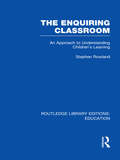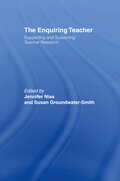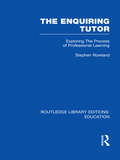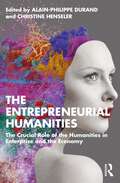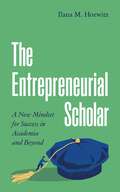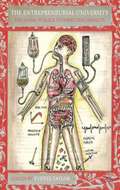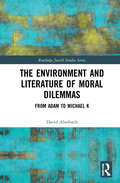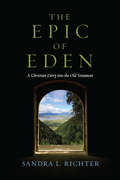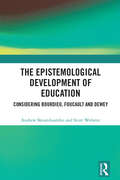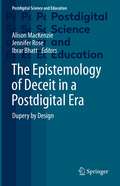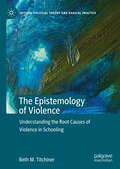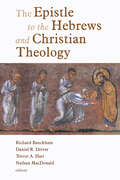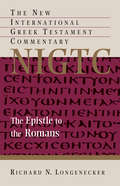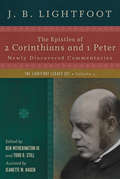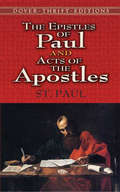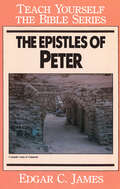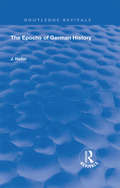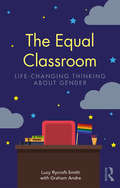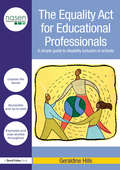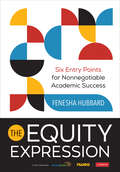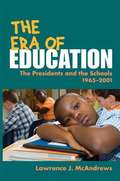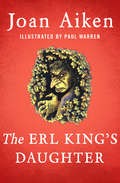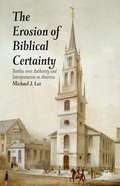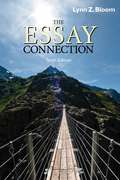- Table View
- List View
The Enquiring Classroom: An Introduction to Children's Learning (Routledge Library Editions: Education)
by Stephen RowlandThis book, by closely recording and reflecting upon the work and play of a group of 9 to 11 year-old children in a primary classroom, develops an approach to teaching and learning which is based upon the ways in which children are able to exercise a controlling influence over their own learning activity. It also suggests the sharing and analysis of classroom experience should be part of a teacher’s day-to-day life. The material for the book was gathered during a year of classroom enquiry in which the author combined the roles of teacher and researcher, working alongside the normal class teacher in a primary school. Samples of the children’s work are carefully described and analysed in an attempt to get behind the overt behaviour of the children and reveal the purposes, concerns and thinking that underlies their activity.
The Enquiring Teacher: Supporting And Sustaining Teacher Research
by Susan Groundwater-Smith Jeniffer NiasFirst Published in 1988. Routledge is an imprint of Taylor & Francis, an informa company.
The Enquiring Tutor: Exploring The Process of Professional Learning (Routledge Library Editions: Education)
by Stephen RowlandStephen Rowland explores the relationship between the turor (or facilitator) and the professional worker on post-experience professional courses. His emphasis in on the processes of reflection and enquiry in professional learning and is not content specific. Drawing upon his experience as a course tutor and the perspectives of students, he suggests an approach to professional learing which is firmly rooted in the experience and interests of the student.
The Entrepreneurial Humanities: The Crucial Role of the Humanities in Enterprise and the Economy
by Alain-Philippe DurandWith AI, cryptocurrency, and more in the news, it seems that being an entrepreneur means being in IT, but humanities graduates are launching new businesses every day, turning a profit and having social impact. This book explores how a humanities background can enable entrepreneurs to thrive. Across all levels of education, students are given the message that to change the world - or make money - the arts and humanities are not the subjects to study. At the same time, discussions of innovation and entrepreneurship highlight the importance of essential skills, such as critical thinking, storytelling, cultural awareness, and ethical decision-making. Here’s the disconnect: the subjects that help to develop these vital skills are derided at critical points in any aspiring entrepreneur’s education. This collection of perspectives from entrepreneurs in a range of fields and humanities educators illustrates what individuals, and the wider world, are missing when humanities are overlooked as a source of inspiration and success in business. Featuring a foreword by Sensemaking author Christian Madsbjerg, this is a thought-provoking guide for aspiring entrepreneurs in all sectors, and for educators, a window on the practical value of the humanities in an ever more mechanized world._
The Entrepreneurial Scholar: A New Mindset for Success in Academia and Beyond (Skills for Scholars)
by Ilana M. HorwitzAn invaluable guide for scholars stifled by the traditional academic routeIn the increasingly competitive world of academia, simply mastering your discipline is no longer enough to guarantee career success or personal fulfillment. The Entrepreneurial Scholar challenges scholars at all stages—from doctoral students to tenured professors—to break free from conventional academic pathways by adopting an entrepreneurial mindset. What opportunities can you create based on who you are, what you know, and who you know?Drawing on her experiences in higher education, start-ups, and management consulting, as well as interviews with a range of academics and entrepreneurs, Ilana Horwitz provides a road map for those stifled by traditional academic norms and expectations. This book calls on scholars to create ideas—not just consume them. It offers strategies to thrive in academia with limited resources and in the face of uncertainty. Embracing an entrepreneurial mindset entails viewing yourself as a knowledge producer, enhancing collaboration, creatively identifying resources, and effectively sharing your ideas.Horwitz empowers all scholars—particularly women and first-generation, low-income, and BIPOC individuals—to see themselves as proactive agents in their educational and career trajectories, despite structural constraints, unclear expectations, or unresponsive advisors. With actionable advice, real-world applications, and inspiring success stories, this guide is vital for anyone aspiring to excel within and beyond the ivory tower.
The Entrepreneurial University
by Yvette TaylorThe entrepreneurial university has been tasked with making an impact. This collection presents professional-personal reflections on research experience and interpretative accounts of navigating fieldwork and broader publics, politics and practices of (dis)engagement primarily through a feminist, queer and gender studies lens.
The Environment and Literature of Moral Dilemmas: From Adam to Michael K (Routledge Jewish Studies Series)
by David AberbachExploring the literature of environmental moral dilemmas from the Hebrew Bible to modern times, this book argues the necessity of cross-disciplinary approaches to environmental studies, as a subject affecting everyone, in every aspect of life. Moral dilemmas are central in the literary genre of protest against the effects of industry, particularly in Romantic literature and ‘Condition of England’ novels. Writers from the time of the Industrial Revolution to the present—including William Blake, Elizabeth Gaskell, Charles Dickens, Émile Zola, Henrik Ibsen, Anton Chekhov, T.S. Eliot, John Steinbeck, George Orwell, and J.M. Coetzee—follow the Bible in seeing environmental problems in moral terms, as a consequence of human agency. The issues raised by these and other writers—including damage to the environment and its effects on health and quality of life, particularly on the poor; economic conflicts of interest; water and air pollution, deforestation, and the environmental effects of war—are fundamentally the same today, making their works a continual source of interest and insight. Sketching a brief literary history on the impact of human behavior on the environment, this volume will be of interest to readers researching environmental studies, literary studies, religious studies and international development, as well as a useful resource to scientists and readers of the Arts.
The Epic of Eden: A Christian Entry into the Old Testament
by Sandra L. RichterDoes your knowledge of the Old Testament feel like a grab bag of people, books, events and ideas? How many times have you resolved to really understand the OT? To finally make sense of it? Perhaps you are suffering from what Sandra Richter calls the "dysfunctional closet syndrome." If so, she has a solution. Like a home-organizing expert, she comes in and helps you straighten up your cluttered closet. Gives you hangers for facts. A timeline to put them on. And handy containers for the clutter on the floor. Plus she fills out your wardrobe of knowledge with exciting new facts and new perspectives. The whole thing is put in usable order--a history of God's redeeming grace. A story that runs from the Eden of the Garden to the garden of the New Jerusalem. Whether you are a frustrated do-it-yourselfer or a beginning student enrolled in a course, this book will organize your understanding of the Old Testament and renew your enthusiasm for studying the Bible as a whole.
The Epistemological Development of Education: Considering Bourdieu, Foucault and Dewey
by Scott Webster Andrew SkourdoumbisThis book documents the political and economic ramifications of the policy impetus for a ‘science of education’ and what this means for classroom teachers, their teaching practices and for the field of education. In a critical exploration of current research and policy articulations of the purposes of education, with attention given to Australia, the UK and the USA, this book delineates the evaluative mechanisms involved in the strategic science as method adoption of accountability, competitiveness and test-driven criteria used in major education policy. It brings together the disciplines of sociology and philosophy by drawing on the theoretical insights of Michel Foucault, Pierre Bourdieu and John Dewey. In addition, the book argues for the deliberate use of the theoretical in education and is against the contemporary unquestioning advocacy that often accompanies a narrowly defined master narrative of a science of education. This book will be of special interest to post-graduate students as source material in general education courses and is also intended for academics with an interest in educational theory/philosophy and the sociology of education.
The Epistemology of Deceit in a Postdigital Era: Dupery by Design (Postdigital Science and Education)
by Jennifer Rose Ibrar Bhatt Alison MacKenzieThis edited book collection offers strong theoretical and philosophical insight into how digital platforms and their constituent algorithms interact with belief systems to achieve deception, and how related vices such as lies, bullshit, misinformation, disinformation, and ignorance contribute to deception. This inter-disciplinary collection explores how we can better understand and respond to these problematic practices. The Epistemology of Deceit in a Postdigital Era: Dupery by Design will be of interest to anyone concerned with deception in a ‘postdigital’ era including fake news, and propaganda online. The election of populist governments across the world has raised concerns that fake news in online platforms is undermining the legitimacy of the press, the democratic process, and the authority of sources such as science, the social sciences and qualified experts. The global reach of Google, YouTube, Twitter, Facebook, and other platforms has shown that they can be used to create and spread fake and misleading news quickly and without control. These platforms operate and thrive in an increasingly balkanised media eco-system where networks of users will predominantly access and consume information that conforms to their existing worldviews. Conflicting positions, even if relevant and authoritative, are suppressed, or overlooked in everyday digital information consumption. Digital platforms have contributed to the prolific spread of false information, enabled ignorance in online news consumers, and fostered confusion over determining fact from fiction. The collection explores: Deception, what it is, and how its proliferation is achieved in online platforms. Truth and the appearance of truth, and the role digital technologies play in pretending to represent truth. How we can counter these vices to protect ourselves and our institutions from their potentially baneful effects. Chapter 15 is available open access under a Creative Commons Attribution 4.0 International License via link.springer.com.
The Epistemology of Violence: Understanding the Root Causes of Violence in Schooling (Critical Political Theory and Radical Practice)
by Beth M. TitchinerThis book provides an in-depth, multidisciplinary framework and case-study analysis for understanding the root causes of violence in schooling. Drawing on critical theory, psychology, neuroscience and learning theory, the author provides a holistic analysis of how ‘violent epistemology’ and the ‘non-conducive circumstances’ that it produces can be seen to be at the roots of violence in societies and social institutions such as schools. Chapter 1 outlines how current and historical theories of violence, and interventions based on them, have failed due to their inability to properly conceptualise the root causes of violence. Chapters 2 addresses this by providing a new epistemic and methodological framework for studying violence. Chapters 3 and 4 then demonstrate how violence can be best conceptualised as a problem of specifically ‘violent’ epistemology and the ‘non-conducive social circumstances’ that it fosters. Chapters 5-7 demonstrate in practice how violent epistemology results in multiple manifestations of violence at the global, national, local, and ultimately classroom level. Chapter 8 concludes the book by presenting an early conceptualisation of ‘non-violent’ epistemology, and what fostering this might look like in practice.
The Epistle to the Hebrews and Christian Theology
by Richard Bauckham, Daniel R. Driver, Trevor A. Hart, and Nathan MacDonaldA significant dialogue between biblical scholars and theologians. The contributors to this substantial volume examine a number of key theological themes in the letter to the Hebrews: the person and nature of the Son, his high-priestly work, cosmology, the epistle's theology of Scripture, supersessionism, the call to faith, and more. Contributors: Edward Adams Loveday Alexander Harold W. Attridge Richard Bauckham Markus Bockmuehl Daniel Driver Douglas Farrow Trevor Hart Richard B. Hays Stephen R. Holmes Morna Hooker Edison M. Kalengyo Mariam J. Kamell Bruce L. McCormack Nathan MacDonald I. Howard Marshall R. Walter L. Moberly Carl Mosser Mark Nanos Nehemia Polen John Polkinghorne Ken Schenck Oskar Skarsaune Daniel J. Treier John Webster Ben Witherington Terry J. Wright
The Epistle to the Romans: A Commentary On The Greek Text (New International Greek Testament Commentary (NIGTC))
by Richard N. LongeneckerThis highly anticipated commentary on the Greek text of Romans by veteran New Testament scholar Richard Longenecker provides solid scholarship and innovative solutions to long-standing interpretive problems. Critical, exegetical, and constructive, yet pastoral in its application, Longenecker’s monumental work on Romans sets a course for the future that will promote a better understanding of this most famous of Paul’s letters and a more relevant contextualization of its message.
The Epistles of 2 Corinthians and 1 Peter: Newly Discovered Commentaries (The Lightfoot Legacy Set)
by Todd D. Still J. B. Lightfoot Ben Witherington III Jeanette M. HagenInterVarsity Press is proud to present The Lightfoot Legacy, a three-volume set of previously unpublished material from J. B. Lightfoot, one of the great biblical scholars of the modern era. In the spring of 2013, Ben Witherington III discovered hundreds of pages of biblical commentary by Lightfoot in the Durham Cathedral Library. While incomplete, these commentaries represent a goldmine for historians and biblical scholars, as well as for the many people who have found Lightfoot's work both informative and edifying, deeply learned and pastorally sensitive. In addition to the material on the Acts of the Apostles and the Gospel of St. John, published in volumes one and two, respectively, there were fragments on 2 Corinthians and 1 Peter. Lightfoot was well known as a Pauline expert given his commentaries on Galatians, Philippians, Colossians and Philemon, and fragments of his work on Romans, 1 Corinthians, Ephesians, and 1 and 2 Thessalonians were published posthumously. It is therefore a delight to have his notes on 2 Corinthians available for the first time. Lightfoot was also interested in the life and work of Peter. The introduction to his commentary on 1 Peter provides insightful analysis of the chronology and context of the epistle. Lightfoot seeks to demonstrate that Peter knew Paul's work and that these two great apostles were in harmony regarding theology and ethics. Now complete, these three commentary volumes reveal a scholar well ahead of his time, one of the great minds of his or any generation.
The Epistles of Paul and Acts of the Apostles (Dover Thrift Editions: Religion)
by St. PaulSaul of Tarsus was on his way to Damascus, bent on destroying the city's Christian community, when a blinding flash of light stopped him in his tracks. Forever changed, the former persecutor of Christians adopted the name Paul and became one of the faith's most famous and active converts. Paul's living example, showing that no sinner is beyond redemption, added a powerful weight to his missionary work. The apostle's letters to churches that he established or visited constitute a substantial part of the New Testament. This volume features a selection of books from the King James edition of the Bible featuring Paul's own words, and a view of his life and ministry.Martin Luther described Paul's Epistles to the Romans — or Romans — as the "most important piece in the New Testament" and "well worth a Christian's while, not only to memorize it word for word but also to occupy himself with it daily, as though it were the daily bread of the soul." Acts of the Apostles — or Acts — discusses Jesus' resurrection and ascension and the ministry of the original Twelve Apostles, in addition to Paul's conversion and the extension of Christianity through him to the "remotest part of the earth."
The Epistles of Peter-Teach Yourself the Bible Series (Teach Yourself the Bible)
by Edgar JamesThe Teach Yourself the Bible Series is one of the best New Testament studies you will find anywhere. Each book in the series is packed full of valuable questions on individual chapters of the Bible, check-ups to test your grasp of scriptural truths, and usable suggestions for group study.Grow in your knowledge of God through each New Testament book, then go on to study six aspects of Christianity essential for all believers: doctrine, prayer, eternal life, prophecy, Christian character, and Bible study. The apostle Peter had received word of the persecution of the churches and the assault of false teachers upon them. In his old age, he wrote words of comfort and counsel to discouraged believers everywhere. No letters of the New Testament hit more directly home to those in trial and persecution than do the epistles of Peter. Strengthen your relationship with the living God with all twenty-five books of the Teach Yourself the Bible Series. Each volume is a timeless, yet practical, study of the Word of God.
The Epochs of German History (Routledge Revivals #18)
by J. HallerOriginally published in 1930. This book is not intended to be a discussion on German history, but to talk about its epochs, a period in which some fresh beginning is made, some fresh determining element enters, some event occurs to give a new direction to the course of history. The book is concerned with the critical moments of German history, the turning points in its course. Those are what we want to consider, wnd also to select as points of vantage from which we may survey the development of the German nation, viewing the panorama section by section.
The Equal Classroom: Life-Changing Thinking About Gender
by Lucy Rycroft-Smith Graham AndreHow much thinking have you done about gender? What does it feel like to be gay, trans or non-binary at school? How unbiased, safe and inclusive are our teachers, our schools and our systems, and what can we do about it? The time is ripe for a re-think, and the issues are pressing. Our pupils are grappling with challenges around gender and sexuality, and they need our well-informed support. Providing evidence, prompts and the space to explore the implications, restrictions and constructs of gender, this book is here to help every teacher reflect on issues around gender roles and expectations in their class. In this challenging and potent book, experts, academics and campaigners join forces to contribute important perspectives to complement Rycroft-Smith’s own accessible and often provocative explanations of many facets of gender and sexuality, including media, literature, toys, clothing, sexism, expectations, sexuality, gender roles, harassment and consent. Humour and anecdotes are thoughtfully intertwined with fascinating insights into biological and cultural perspectives and societal norms, highlighting why it’s so vital to teach pupils about gender issues, as well as modelling consent, good quality relationships and tolerance to children at all ages and stages of their school career. Providing clear, practical policy recommendations in an accessible and engaging way, The Equal Classroom is an essential read for any teacher or education professional who wants to ensure their school is a place where all pupils feel truly welcome and able to flourish, comfortable and safe in their emerging identities.
The Equality Act for Educational Professionals: A simple guide to disability inclusion in schools (nasen spotlight)
by Geraldine Hills"A definite must for SENCOS." -- Urmston Junior School "A good insight into process of tribunal and what the Equality Act means." -- Team Leader, St Paul's CE Primary School 'A much needed resource in supporting schools, centres, day nurseries and community childcare provision to understand the complexity of the issues surrounding SEN... A valuable tool.’ -- Gerri Ross – Head of Old Moat Sure Start Children’s Centre, UK "Straightforward and easily accessible...I would recommend this book to undergraduates and professionals alike who have an interest in ensuring that the rights of disabled children are upheld." -- Dr Craig Blyth, School of Education, University of Manchester, UK Under the Equality Act (2010), all schools and service providers have a legal obligation to make provision for disabled pupils, staff and school users. If you’re feeling confused and concerned about the content and implications of the Disability Duty Act (1995) and the more recently released Equality Act (2010), and how it affects your setting, this essential book will help you unpick the issues in a user-friendly and easily accessible way. This highly practical resource: explains the main parts of Equality Act (2010) as it affects disability in a way that will encourage all members of staff within a school to feel confident that they are correctly implementing its requirements; discusses ‘reasonable adjustments’ and ‘less favourable treatment’ which are at the heart of the legislation; shows how ‘less favourable treatment’ and ‘reasonable adjustments’ apply to admissions, exclusions, handling of medicines and during school trips; uses examples and case studies throughout, and highlights the key factors for success in making reasonable adjustments; takes readers through the process of an alleged act of discrimination against the school, and how it may be resolved, up to and including the SEND tribunal process. The author brings a wealth of experience to this topic, both as a parent of a disabled child and as a trainer of professionals. She uses her unique insight to develop skills and awareness in anyone who follows her material, and shows through tried and tested concepts and methods, how schools and settings can avoid costly and stressful tribunals. Headteachers, teachers, SENCos, Sure Start Centre Managers and anyone who works in educational settings will find this book essential to their professional development and a fantastic source of support and help.
The Equity Expression: Six Entry Points for Nonnegotiable Academic Success
by Fenesha HubbardCreate space for equity conversations that empower Equity work is not a destination, but a journey. Equity work is nuanced and often difficult to discuss. In The Equity Expression, Hubbard creates space for equity conversations and empowers practitioners to be equity change agents. Built around the framework of six entry points—systems, mindsets, relationships, products, spaces, and processes—this guide serves as a tool for deliberate and productive planning for equitable change. Reaching into the deepest layers of self to identify personal beliefs, practitioners can use this book to tackle hard truths and challenge themselves to do better. This book provides a fresh take on dissecting equity with a lens to positively impact all students, including Concrete sequential steps to work towards solutions A set of tools to identify problems of practice and establish implementation plans through the six entry points for equity Reflection questions to help educators turn findings into actionable plans For those committed to helping students succeed, the steps outlined in this book provide meaningful solutions to embed equity into every learning culture.
The Equity Expression: Six Entry Points for Nonnegotiable Academic Success
by Fenesha HubbardCreate space for equity conversations that empower Equity work is not a destination, but a journey. Equity work is nuanced and often difficult to discuss. In The Equity Expression, Hubbard creates space for equity conversations and empowers practitioners to be equity change agents. Built around the framework of six entry points—systems, mindsets, relationships, products, spaces, and processes—this guide serves as a tool for deliberate and productive planning for equitable change. Reaching into the deepest layers of self to identify personal beliefs, practitioners can use this book to tackle hard truths and challenge themselves to do better. This book provides a fresh take on dissecting equity with a lens to positively impact all students, including Concrete sequential steps to work towards solutions A set of tools to identify problems of practice and establish implementation plans through the six entry points for equity Reflection questions to help educators turn findings into actionable plans For those committed to helping students succeed, the steps outlined in this book provide meaningful solutions to embed equity into every learning culture.
The Era of Education: The Presidents and the Schools, 1965-2001
by Lawrence J. McandrewsThis study of educational policy from Lyndon Johnson through Bill Clinton focuses on three specific issues--public school aid, non-public (especially Catholic) school aid, and school desegregation--that speak to the proper role of the federal government in education as well as to how education issues embody larger questions of opportunity, exclusion, and equality in American society. Lawrence J. McAndrews traces the evolution of policy as each president developed (or avoided developing) a stance toward these issues and discusses the repercussions and implications of policy decisions for the educational community over nearly four decades.
The Erl King's Daughter
by Joan Aiken Paul WarrenKimballs Green Junior School's newest student is more than a little strange--in fact, she might be the feared daughter of the Erl King! Kevin loves sharing the stories his grandmother used to tell him about trolls and witches with his school friends. His favorite tale is about a scary spook named the Erl King who rides on a black horse at night. But when a new student, Nora Scull, arrives at Kimballs Green elementary school, Kevin begins to wonder if maybe the stories are true. Skinny as a broom and with dark, stringy hair, Nora never laughs, but she's always watching and listening. She also steals and makes Kevin do all sorts of bad things. Who is Nora, and what will Kevin have to do to save himself--and his school? This ebook features illustrations by Paul Warren and a personal history of Joan Aiken including rare images from the author's estate.
The Erosion of Biblical Certainty: Battles over Authority and Interpretation in America
by Michael J. LeeAccording to conventional wisdom, by the late 1800s, the image of Bible as a supernatural and infallible text crumbled in the eyes of intellectuals under the assaults of secularizing forces. This book corrects the narrative by arguing that in America, the road to skepticism had already been paved by the Scriptures' most able and ardent defenders.
